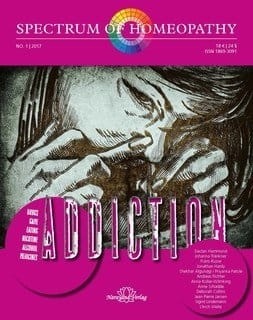Addiction - Spectrum of Homeopathy 2017/1
SPECTRUM investigates addiction, a major issue of our time, presenting the practical experience of our international group of authors on the homeopathic treatment of substance addiction as well as non-substance addiction, such as compulsive shopping and gambling. With outstanding contributions from Frans Kusse on trauma and addiction, Jonathan Hardy on the use of milk remedies for bulimia and heroin addiction, and Ulrich Welte on compulsive gambling.
The treatment of addiction is as complex as the addiction itself. The Irish homeopath Declan Hammond, who has treated heroin addicts from the poor districts as well as workaholic cocaine-addicted yuppies, summarises his understanding of this topic with a quote from the Canadian addiction therapist Gabor Maté: “Many of us resemble the drug addict in our ineffectual efforts to fill in the spiritual black hole, the void at the centre, where we have lost touch with our souls, our spirit – with those sources of meaning and value that are not contingent or fleeting. Our consumerist, acquisition-, action-, and image-mad culture only serves to deepen the hole, leaving us emptier than before.”
Every addition develops its own dynamic that finally – regardless of the type of addiction – leads to stereotypical behavioural patterns. The psychologist Johanna Tränkner demonstrates this by comparing the symptoms of drug abuse and non-substance forms of addiction such as compulsive shopping, workaholism, compulsive gambling and sex addiction. Finding the root causes and the solution in the depths of the soul is the major challenge for homeopaths in treating these conditions. The causes are as variable as the cases in this issue of SPECTRUM: Deborah Collins presents a case of destructive rage, Andreas Richter describes insecure bonding in a little boy addicted to love and Frans Kusse offers numerous examples of the relationship between trauma and addiction.
Certain homeopathic remedy groups are apparently more indicated than others in the treatment of addiction. So Jonathan Hardy highlights the milk remedies to explain the gnawing feeling of inner emptiness and the urge to fill it. The drug remedies, which can be used as nosodes during withdrawal, also play a major role, as described by Frans Kusse for Cannabis addiction. But we can expect the most success from remedies with a deep constitutional similarity. Anne Schadde used Ephedra to treat a drug-addicted superwoman, Anne Koller-Wilmking sees the similarity of a patient dependent on sex and alcohol in the picture of Natrium fluoratum, and Sigrid Lindemann recognises the addictive pattern of withdrawal, isolation and escape in a case of Oncorhynchus tshawytscha, Chinook salmon. In Ulrich Welte’s case, a young patient addicted to computer games is given Franciscea, a nightshade from the syphilitic miasm. The case histories show that homeopathy can undoubtedly play a valuable role in the treatment of addiction. Yet competent psychosocial treatment is also necessary in each case since, as Hammond puts it: “Addiction thrives in isolation”.
- Author: Narayana Verlag
- ISBN: No ISBN
- 108 pages
- Paperback
- Published in 2017
- Printed in Germany

